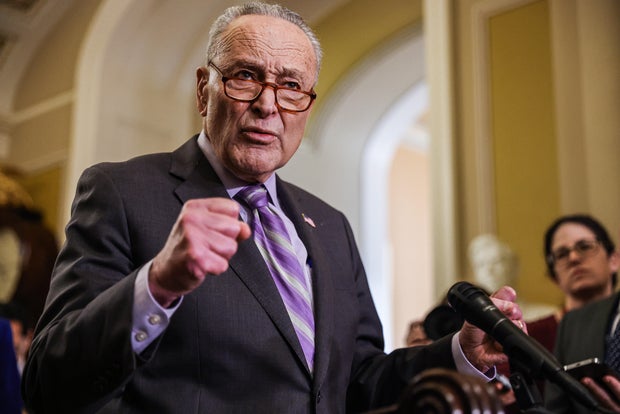Washington — The Senate failed to advance a national security bill that included sweeping border security reforms on Wednesday, with GOP senators and a handful of Democrats rejecting the result of months of bipartisan talks.
The bill also included tens of billions of dollars in foreign aid to Ukraine, Israel, Taiwan and other national security priorities. Democratic leaders planned to move quickly to a vote on the foreign aid portions of the legislation, which some Republicans said they would support.
A procedural vote to begin debate on the version of the bill that included border security measures was 49 in favor to 50 against, falling short of the 60-vote threshold needed to advance.
The outcome was widely expected, since many Republican senators had come out against the border agreement after it was released on Sunday, saying the legislation would not go far enough in stopping border crossings and tightening asylum laws. Nevertheless, Majority Leader Chuck Schumer forged ahead with the vote, opting to put members on the record with their position.
“Today, senators face a decision several months in the making,” Schumer said from the Senate floor ahead of the vote. “Will Senate Republicans vote to start debate — just a debate — on bipartisan legislation to strengthen America’s security, stand with Ukraine, and fix our border, or will they cow to Donald Trump’s orders to kill this bill?”
Schumer said he plans to move forward with a vote on the foreign aid elements of the bill. Whether the slimmed-down bill will gain the 60 votes needed to move forward in the chamber remains to be seen.
“Republicans have said they can’t pass Ukraine without [the] border. Now they say they can’t pass Ukraine with [the] border,” Schumer said. “Today, I have laid out both options for Republicans to do the right thing.”
The fight over the border and Ukraine
The about-face from Republicans — demanding border security concessions from Democrats, then opposing them once they were secured — comes more than four months after the initial standoff over the White House’s funding request.
Former House Speaker Kevin McCarthy first touted the move to tie border funds to Ukraine aid in the final days of his speakership, in a last-ditch attempt to win over the House conservatives who would eventually vote to oust him. He emphasized at the time that Ukraine wouldn’t receive another U.S. aid package “if the border is not secure.”
“I support being able to make sure Ukraine has the weapons that they need. But I firmly support the border first,” McCarthy said on “Face the Nation” in October. “So we’ve got to find a way that we can do this together.”
Some House Republicans had already grown skeptical of more aid to Ukraine in particular, while more Senate Republicans generally backed continuing to support Kyiv in its war with Russia. But the GOP quickly coalesced around the idea that the U.S.-Mexico border must be addressed if Ukraine was to receive additional aid.
Just four months later, after the party largely rejected the border security components of the supplemental, some Republicans expressed openness to backing it without the border provisions, as Democrats accused the GOP of changing its tune on the border.
“Within 24 hours of releasing the long-awaited bipartisan compromise that our Republican colleagues demanded as a condition to move Ukraine forward, Leader McConnell and the Republican conference did a 180-degree reversal,” Schumer said. “They were quaking at the knees at the fear of Donald Trump.”
The dynamics make the supplemental funding package’s prospects, without border security, unclear. Senate Minority Leader Mitch McConnell threw his support behind the move on Tuesday, calling the other elements of the supplemental “extremely important” and arguing that “we ought to tackle the rest of it.”
But even if the national security package passes the Senate, its future is even more up in the air in the Republican-controlled House.
Nikole Killion and Alan He contributed reporting.

